










Cover Feature
AFTER HIM: FROM GRIEF TO GREATER PURPOSE
Dr. Sharon Norris Elliott recounts her grief journey after the loss of her husband. She encourages the grieving to embrqce the process and also discover their new purpose in life.
5. FROM THE PUBLISHER & EDITOR
Linda Evans Shepherd explains that the mission of Leading Hearts is to shine a light in a world hungry for Jesus. Amber Weigand-Buckley challenges us to do more than “keep calm and carry on.”
6. GRACE FOX
3 Ways to Refocus on God’s Peace
10. LINDA EVANS SHEPHERD
When Your Plans Go Up in Smoke
14. CYNTHIA L. SIMMONS
Abigail Adams: Stress throughout History
19. STACY SANCHEZ
Parenting ... Again?!! When You’re Trying to Hold It Together—And Drowning at the Same Time

EDITORIAL STAFF
PUBLISHER/ADVERTISING
Linda Evans Shepherd
EDITOR/ART DIRECTOR ............... Amber Weigand-Buckley
LAYOUT EDITOR ........................... Tom Young
CONTRIBUTING EDITORS............. Joy Dunlap, Rebecca White, Tom Young
PROMOTIONS Rebecca White
AWSA ADMINISTRATIVE ASST. Carla Wicks & Nicole Wicks
CONTRIBUTORS Dr. Sharon Norris Elliott, Pam Farrel, Grace Fox, Terrie Hellard-Brown, Gretchen Huesmann, Lee Ann Mancini, Stacy Sanchez, Sheri Schofield, Cynthia L. Simmons
ARISE DAILY Dr. Mel Tavares, Editor; Tom Young, Copy Editor
Linda Evans Shepherd (President), Dawn Scott Damon, Edie Melson, Linda Goldfarb, Sharon Norris Elliott, Karen Whiting and Joy A. Schneider


9. LEE ANN MANCINI
The Power of the Written Word: Pages of Faith
15. PAM FARREL
Snapshots of the Savior
16. SHERI SCHOFIELD
Leading during Conflict: A Guide to Taking Off the Gloves
20. TERRIE HELLARD-BROWN
The Storyteller’s Calling: 5 Principles to Make the Lessons We Teach Stick
22. GRETCHEN HUESMANN
Beyond the Thank You Card: What Teachers Really Need
Leading Hearts magazine for Christian Women is published bimonthly by Right to the Heart Ministries 2025. ISSN 2380-5455
ADVERTISING | Display rates are available at leadinghearts.com. By accepting an advertisement, Leading Hearts does not endorse any advertiser or product. We reserve the right to reject advertisements not consistent with the magazines objectives.
MANUSCRIPTS | Writers guidelines are available at leadinghearts.com.
Leading Hearts | PO Box 6421, Longmont, CO 80501 email: ReachOut2Linda@gmail.com
EPA MEMBER | 2024 Evangelical Press Association. Award of Excellence 2014–2021, 2023 Evangelical Press Association Award of Merit Winner—Christian Ministry Digital | 2024 Christian Ministry Print Publication & 2022 Christian Ministry Digital Best in Class
Photos courtesy of: Canva
Copyright ©2025 Right to the Heart Ministries. All rights reserved. Copyrighted material reprinted with permission.
All Scripture quotations, unless otherwise indicated, are taken from the Holy Bible, New International Version®, NIV®. Copyright ©1973, 1978, 1984, 2011 by Biblica, Inc.™ Used by permission of Zondervan. All rights reserved worldwide. www.zondervan.com The “NIV” and “New International Version” are trademarks registered in the United States Patent and Trademark Office by Biblica, Inc.™

Welcome to Leading Hearts—an EPA award-winning magazine created by the members of the Advanced Writers and Speakers Association. As AWSA celebrates our 25th year, I find myself reflecting on what God has built through us—over 1,000 strong—women committed to using our words, our stories, and our gifts to glorify Him.
What began as a support system for Christian women in publishing and speaking has become something much more. We’ve grown into a powerful sisterhood of encouragers—an alliance of authors, speakers, podcasters, mentors, and media professionals. In a world that prizes platform and competition, we’ve discovered a better way: unity. We pray for one another. We champion each other’s books and messages. We speak life into dreams that feel stuck. Because we know—we’re not competing. We’re co-laborers in the Kingdom.
Sometimes I imagine us like the wise virgins in Jesus’ parable, lamps filled and lit, waiting expectantly for the Bridegroom. But we’re not just waiting—we’re standing strong, lighting the way for others, for our Lord. Each message we write, each story we share, becomes a flame passed forward in a world hungry for Jesus. That’s the heartbeat of Leading Hearts. We aren’t just creating content. We’re making way for the coming of Jesus, one word, one book, one message at a time.
As you turn these pages, may you find encouragement, wisdom, and the spark of your own calling re-lit. You are not alone. You are part of a radiant company—carrying the light of Christ into every dark corner.
I’ve always carried “keep calm and carry on” as my personal motto, even before I married my British hubby. But I recently discovered I’d been getting it all wrong.


Growing up in a household where my dad battled depression and anger, the unspoken rule was simple: shut up and keep the peace. I thought this was strength.
This truth hit me during a particularly stressful morning commute. As I sat in traffic those words struck me differently: Keep calm and don’t carry it on.
My husband learned the same stiff-upper-lip mentality. We both believed keeping calm meant hiding our emotions and soldiering on. But God doesn’t work that way—He asks us to relinquish, not suppress.
At the red light, I literally had to release my white-knuckle grip on the steering wheel and turn my palms up in surrender. That simple gesture became my posture of releasing what I was carrying to the One who wants to take it.
“Cast your cares on Him because He cares for you” (1 Peter 5:7 NIV) isn’t just a nice verse—it’s an invitation. Sometimes my anxiety is a tangled ball of worry about finances, family, and world events. But when I hand the knotted up feeling for God to untangle I find real peace.
As you read this issue I pray that you will embrace the calm when a flip of your hands—palms up!


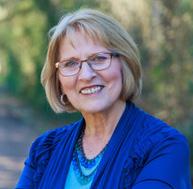
BY GRACE FOX GRACEFOX.COM
Our three children were preschoolers when my husband’s role at work shifted and required him to travel overseas on a regular basis. I dreaded his absence especially at nighttime because the dark terrified me.
A couple of years prior, someone had broken into our home and stolen a few valuables. The perpetrator was never caught, and that left me feeling vulnerable. Every time my husband was gone, I imagined the robber watching our house and planning a second strike while I slept.
Afraid of being victimized again, I armed myself by keeping my bedside lamp on all night. I reasoned that, if the bad guy broke in, the light would allow me to see his face and identify him later in a police lineup. Trouble was, the light kept me awake, and lack of sleep turned me into an exhausted, grouchy mom.
One bedtime, in desperation, I cried to God for help, and He brought Psalm 127:1 to mind: “Unless the LORD protects a city, guarding it with sentries will do no good.”
The power of God’s truth produced the breakthrough I needed. In that moment, I realized how focusing on my fears had strengthened their choke hold on my life, and I chose to do things differently. “Help me, God,” I prayed. “Post Your angels at both doors and every corner of my house while I rest. Good night.” An indescribable peace washed over me as I turned off the lamp and fell asleep.
The fear of victimization fell away that night and has never returned, for which I am grateful, but I have wrestled with other fears since then: the fear for my kids’ and grandkids’ well-being, the fear for my husband’s health when he underwent cancer treatment, the fear of inadequacy in fulfilling
ministry-related commitments, and the fear of an unknown future in this wacky world in which we live. Rather than focusing on the what-ifs and allowing fear to become a stronghold again, I meditate on God’s truth and ask Him for help. Inevitably, my perspective changes and peace floods my mind.
Focusing on who God is as manifest through His Hebrew names has been especially helpful. Here are three of my favorites:

1. Immanuel—“God with us”
(Genesis 16:7–13) This name also implies understanding and care, like a shepherd cares for his sheep. No matter our situation, we can rest assured that God sees every detail and cares about our well-being. We can trust Him to meet us at our deepest point of need.
3. El Shaddai—“God Almighty”
God’s truth produced the breakthrough I needed.
When facing frightening circumstances, I recall biblical promises that assure me of God’s presence (Joshua 1:9; Matthew 28:20; John 14:16). Those promises are plentiful, so be encouraged: you are not alone when you walk through fire, flood, and dark valleys. The all-powerful God is with you. Cling to this truth, and peace that passes understanding will override anxiety.
2. El Roi—“the God who sees me”
As He saw and met Hagar in the wilderness when she was alone and afraid, so El Roi sees us in our distress.
This name suggests that God is all-powerful. Because of who He is, we can trust Him to meet every need we will ever know. When we need wisdom, He supplies. When we need guidance, He supplies. When we need strength, He supplies. His sufficiency is infinite, and so is His love for us. Learning to live from this truth helps make it possible for us to experience His gift of peace.
No matter what we face, let’s remember the power of God’s truth to overcome our fears. Let’s hold tight to it and let it lead us to a place of inner peace.

Grace Fox is a career missionary and award-winning author of 15 books including Names of God: Knowing Peace. She’s a Bible teacher and writes for “First 5” (Proverbs 31 Ministries).


This remarkable book holds the keys to establishing spiritual bedrock in your child’s life.
— Dr. Scott Turansky, Cofounder of the National Center for Biblical Parenting
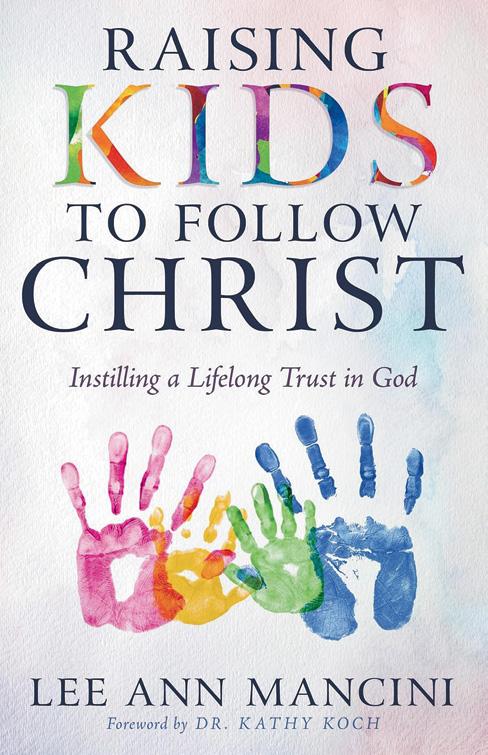


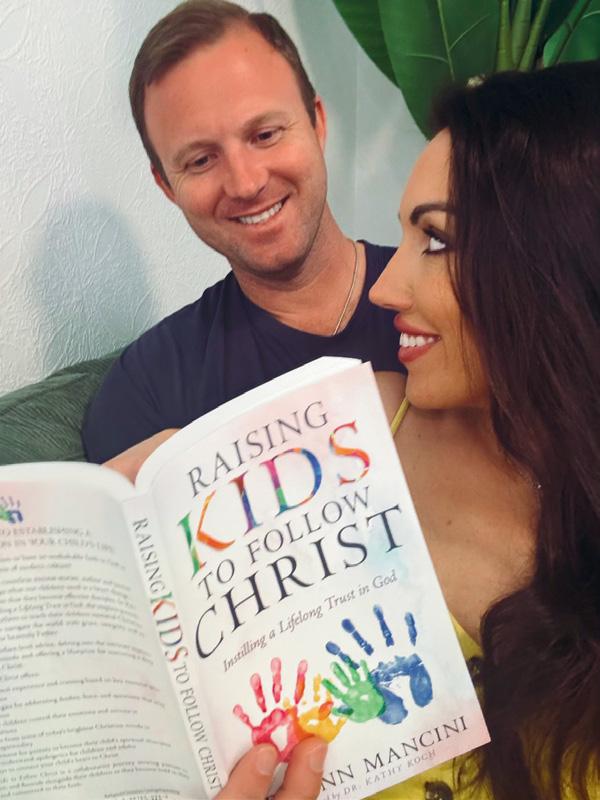

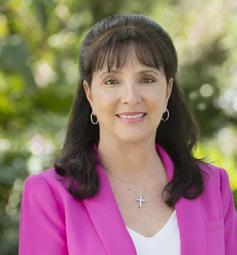
BY LEE ANN MANCINI RAISINGCHRISTIANKIDS.COM
I
fondly recall the times my children would cuddle up on my lap to hear a bedtime story or read a Bible story.
It was a meaningful part of our day. It was a time to explore new places, discover fascinating facts, and, most importantly, to connect our hearts.
My son loved the story of David and Goliath, while my daughter’s favorite was the story of Jesus’ birth. I was helping to create an unbreakable bond while planting seeds of biblical truth and nurturing spiritual growth. Children learn and remember biblical concepts more readily through stories.

2. Reading books offers children a rich and multifaceted experience that nurtures both their minds and hearts. It encourages and helps build comprehension as children follow plots, understand the context of the story, and interpret meaning. Stories help them develop an emotional connection with characters, learning sympathy and empathy as they engage with their feelings. They learn to become critical thinkers as they analyze situations and anticipate a story’s outcome. Reading stories sparks their imagination as they envision new worlds, think creatively, and explore possibilities beyond daily routines. Reading inspires lifelong learning and spiritual growth.
3. Unique bonding opportunities among generations come from reading with our children and grandchildren—something that modern media cannot duplicate. When a grandparent reads a cherished faith story to their grandchild, they’re sharing an emotional connection and a lived experience.
4. Asking questions enhances children’s critical and reflective thinking skills, expands vocabulary and language skills, and helps them develop social skills. Questions encourage their desire to be curious and develop a love for learning. Having children contribute to the discussion through questions helps them build confidence. It stimulates emotional awareness as they recognize their emotions and strengthens the bond between parent and child.
Ask questions that help children become critical thinkers:
Knowledge questions: “How many gifts did the kings bring to baby Jesus?”
While they may outgrow your lap, they’ll never outgrow the spiritual foundation you help build.
Biblical stories offer a faith lesson that reflects on Jesus within the story, while a moral lesson teaches how Jesus acted. We learn from His character and His behavior. Faith and moral lessons provide a solid, cohesive foundation for faith formation, moral attitudes, and moral behaviors. Biblical faith formation is essential for obtaining a Christian worldview.
1. Reading engages the left side of the brain in unique and meaningful ways that differ from digital media, such as video games, computers, tablets, or phones. When children read, they engage their imagination, connect with characters, and ponder what is about to happen next. This kind of active involvement helps build strong brain connections and leaves lasting heartfelt impressions that transform their character.
Comprehension questions: “What do all these stories have to do with each other?
Application questions: “How can praying to the Holy Spirit help you when you are afraid of the dark?”
Analysis questions: “Why did Moses’ mother place him in the river?”
Savor the precious moments you share with your child or grandchild—whether it’s a bedtime story, a heartfelt conversation, or a simple hug. These early years pass by more quickly than we realize, but the love, wisdom, and faith you pour into them during this time can leave a lasting imprint.
The seeds you plant now can bear fruit for a lifetime— even into eternity.
While they may outgrow your lap, they’ll never outgrow the spiritual foundation you help build.

Lee Ann Mancini, author of Raising Kids to Follow Christ, adjunct professor at South Florida Bible College & Theological Seminary, founder of Raising Christian Kids, executive producer of Sea Kids.

I was having a really bad day. The kind of day that makes you question all your life choices and pack extra deodorant.
It started somewhere between Dallas and San Antonio, where I was napping in seat 27A, minding my own business, when my eyes suddenly snapped open. Something wasn’t right. I looked up to see smoke curling out of the air vent.
I blinked. Then I leaned toward the man beside me and whispered, “Is that … smoke?”

Sometimes, the worst days are sneakily wrapped beginnings.

He looked pale. As if he’d just read his own obituary. He nodded slowly, eyes wide.



Then the captain came on the intercom with that eerily calm pilot voice they use when they’re trying not to say, “Brace for impact.”
“Ladies and gentlemen, the jet is on fire. We’ve been instructed to return to Dallas for an emergency landing.”



Now, I’m no aviation expert, but even I know 747s don’t turn on a dime. Except, somehow, ours did. Midair. We banked hard and barreled back toward Dallas at an altitude so low I could read a church sign in Grapevine, Texas.
As a Christian speaker, I noticed that detail—and I remember praying, “Lord, I never got a chance to speak at that church.”
The runway was lined with fire trucks and ambulances, red lights blinking like a divine Christmas display. But the landing? Smooth as butter. The pilot stood at the jet door like a greeter at Cracker Barrel, shaking each of our hands. I could tell—he was thanking God for every single soul who stepped off his plane. We were all handed a $5 food court voucher, which felt like a pretty modest reward for not dying in a fireball.
You’d think that was the end of the drama. I thought the chaos was over—but God had a few more plot twists. After the opening session of the National Speakers Association convention, someone invited me to a prayer meeting in the penthouse. Considering I’d just survived a near plane crash, I knew I’d better be there.
The elevator was packed tighter than a Sunday potluck line. Just as we neared the top of the skyscraper, the elevator jolted—and stopped. Dead. Between floors.
At first, we all stood there in awkward silence. Then came the realization: we were trapped. No air, no escape, and no exits—just a whole lot of speakers who suddenly had plenty of new material.
Eventually, the doors were pried open by the local fire department. The next floor was a good three feet above my head. Since I was closest to the front, everyone just sort of ... looked at me. Without a vote or a hallelujah, I was first in line.
Now, here’s where it gets fun. I was wearing a mid-length skirt with an elastic waistband, and—I’ll confess—I’d forgotten my slip at home. The idea of climbing out of my skirt in front of a dozen strangers made me hesitate. Hard.
But I didn’t have to decide.
The big guy in the back took matters into his own hands—literally. Without warning, he picked me up and tossed me through the open elevator door like a carryon bag. I landed belly-first on the hallway carpet and slid a good six feet like a shuffleboard puck.
And do you know what I realized while sliding across the floor of that fancy hotel?
My skirt wasn’t about to fall off.
Turns out, my hips were doing the Lord’s work that day.
Later that night, I watched Dan Rather describe our near-death flight on the news. It’s always a good day when you can watch the burning jet you survived from the comfort of a hotel room while sitting on your bed munching trail mix.
And about that church in Grapevine—the one I thought I’d never speak at? I eventually did. And let me tell you, I had one unforgettable opener.
What’s the Point of All This?
Sometimes, the worst days are sneakily wrapped beginnings. Sometimes, flaming jets and stuck elevators turn into connection, laughter, and even calling.
In fact, I’ve had dinner—twice—with people I met on that elevator. We laugh now. We remember. We marvel.
God doesn’t just redeem moments. He reroutes them— and often, the deeper miracles are uncovered when you surrender to trusting God in the chaos. That’s the secret: never surrender to chaos. Surrender in it—to the One who’s still writing your story.
“Because of the Lord’s great love we are not consumed,for his compassions never fail. They are new every morning; great is your faithfulness.” — Lamentations 3:22–23 (NIV)
So if your plans are up in smoke or stuck between floors? Don’t panic.
You’re not finished. You’re just being redirected.
And who knows? Maybe your hips are wider than you think.

Linda Evans Shepherd, the publisher of Leading Hearts, and the founder of the Advanced Writers and Speakers Association. Watch for her new book Praying the Word for Women 90 Scripture-Powered Prayers to Calm an Anxious Heart from Christian Art Gifts out later this year.



“You are looking at Jesus right now.”
At 12:45 AM on May 16th, Dr. Sharon Norris Elliott spoke these words to her husband, James, as he took his final breath. In that sacred moment, as his chest rose once more and then stilled forever, Sharon experienced something she never expected: profound spiritual clarity.
“All the stuff that I write about and I preach about and I teach about—at that moment, it hit me, ‘This is it. This is what we are all doing all of this for.’”
But Sharon’s journey to that bedside began months earlier, on a late December evening when James came to her office door with words that would change everything: “I think you need to take me to the hospital because I’m having this really bad pain in my side.”
“God’s Going to Heal Me”
The diagnosis came a few days later on James’s birthday: liver cancer with a large tumor. For Sharon and James, married 21 years and devoted Christians, the response was immediate and unwavering. James declared, “God’s going to heal me.”
Sharon then covered their home with healing Scriptures on index cards, placing them everywhere James would see them. Their faith became their battle plan. When they met the oncologist, Sharon thought, “This man
doesn’t know Jesus. So he’s going to watch Jesus work. It’s going to be a big testimony.”
But faith doesn’t always unfold the way we expect. When the Holy Spirit Rewrites Your Theology
Two weeks before James came home on hospice care, Sharon received what she describes as a pivotal message from the Holy Spirit: “All of My Word is true.” At first, she didn’t understand. They were standing on healing Scriptures—of course God’s Word was true.
But the Spirit pressed deeper: “All of My Word is true.”
Sharon went back through Scripture with fresh eyes. “It then jumped out at me that there’s going to be a resurrection of the just and the unjust,” she recalls. “If Christians didn’t die, that Scripture can’t be true.” She also remembered Psalm 116:15, “Precious in the sight of the Lord is the death of his saints.”
The realization hit her: “So James is going to die.”
This revelation didn’t destroy her faith—it prepared her heart. “It still didn’t become about me,” Sharon says. “I’ve got to walk with him until he gets to where he’s supposed to be.” That’s exactly what Sharon was doing—walking James home to Jesus.
The full weight of loss didn’t flood in on Sharon immediately. She had been in caregiver mode for months. It wasn’t until the mortuary attendants gently carried James’ body out of their home that reality crashed over her.
“I remember coming back in the house, going into the
room where James had been, and looking out of the window at how beautiful a day it was. I wondered why and how it could be such a pretty day. How, why are there cars just driving up and down the street?” Sharon recalls. “And then I just broke down.”
She had transitioned from full-time caregiver to widow in a single moment.
What kept Sharon going wasn’t just her faith—it was having something to do, a purpose already begun. As a writer, speaker, and ministry leader, she had work that had been put on hold during James’s illness. “I had a ministry and I had purpose and a relationship with God apart from my relationship with James,” she explains. “That makes all the difference in the world.”
What began as monthly Facebook posts on the 16th of each month—sharing how she was doing and processing her grief—gradually became something more. By the third month, other widows began responding, saying her words were helping them express feelings they couldn’t put into words themselves.

Then came another pivitol moment.
offers hope. “God has a purpose for all of us. What is it that God would want you to do? What’s in your hand?”
Her message is both challenging and encouraging. “God has you here not to just mope around your house. He’s left you here in order to get something done.”
What changed Sharon’s whole outlook? “Grief is supposed to be a season, not a permanent residence.”
Perhaps most importantly, Sharon gives widows permission to experience joy again. “I want them to be able to smile again, to not blame God, and to not become bitter. You serve a God of wonder who is still giving you His favor.”
Her advice is both practical and tender. “It’s okay to take off the black. It’s okay to wear some orange and yellow and appreciate butterflies. I doubt that your husband would have wanted you to just be moping around and not smiling.”
Grief is supposed to be a season, not a permanent residence.
A pastor’s wife approached Sharon at a speaking engagement. She had printed out one of Sharon’s Facebook posts and shared it with their couples’ fellowship. “Reading it saved several marriages,” the woman told her. That’s when the Holy Spirit whispered: “We can do something else with these.”
The result is After Him: A Widow’s First Year Devotional Journal—18 entries that take readers through the grief journey with reflection, Scripture, and journaling space.
Long before her journey through grief, Sharon’s ministry operated under the tagline “Live Significantly.” Now, those words carry even more profound meaning. For widows struggling with grief and lack of purpose, this philosophy becomes especially crucial.
Drawing from biblical examples, Sharon outlines five key questions every grieving woman should ask herself:
Hannah’s Question: What do you have to give away?
Abraham’s Question: Where is God calling you to go?
Noah’s Question: What do you need to build?
David’s Question: Who do you need to confess?
Samuel’s Question: What is God saying to you?
For women who spent their lives taking care of families, this time of grief can feel overwhelming. But Sharon
Sharon speaks openly about being comfortable with her identity as “James’s widow”—not as a burden to carry, but as a testament to a great love. Her eyes light up as she thinks of their marriage, “I had a great love in my life.”
She’s learned to think about the funny moments and sweet memories without the sharp pain of grief. She remembers James winking at her during communion services, even when he was supposed to be solemn as a deacon.
“He used to wink at me every opportunity he got,” she recalls with a smile. “But he’s not winking at me now. He’s enjoying looking at Jesus face-to-face.”
For widows walking this hard road, Sharon’s message is straightforward: honor the love you shared, grieve fully but don’t set up camp there, and ask yourself “What’s in your hand?” Trust that God still has work for you to do.
“If you’re leaving me, I’m coming with you,” Sharon and James used to tell each other. Now she says, “I’m going with him, but I’m not going right now. I’ve got some stuff to get done first.”
That “stuff” includes not only helping others write their books, but also assisting other widows see that their stories aren’t over—they’re starting a new chapter.

Dr. Sharon Norris Elliott’s book After Him: A Widow’s First Year Devotional Journal is available now. To learn more about her ministry, visit lifethatmatters.net.



BY CYNTHIA L. SIMMONS CLSIMMONS.COM
Abigail Adams detested the intense political feelings that raged during her husband’s administration and the invectives hurled at him. Federalists and Democratic-Republicans exchanged bitter words, with reporters calling President Adams ugly names such as “crippled” and “toothless.”
The new nation faced real danger. The French Revolution threatened European monarchies, leading to war with Britain. France attacked American ships and French journalists attempted to incite rebellion. Both John and Abigail feared this would bring French Revolution chaos to America.

Congress passed the Alien and Sedition Acts in 1798 to quell foreign dissent. While Abigail rejoiced as courts sentenced Americans to jail for speaking out, vitriol increased. Opposition came from Thomas Jefferson, James Madison, and even her son John Quincy.
1. Let Scripture Rewire Your Brain
Scripture meditation refreshes thoughts and provides a positive outlook. Abraham Lincoln pored over the Bible when overwhelmed. Psalm 19 talks about God’s Word “reviving the soul” (Psalm 19:7 ESV).
2. Escape the Noise
Taking breaks and time outside recharges your batteries. Psalm 23 says the good shepherd “makes me lie down in green pastures.” Abigail and John took yearly vacations she eagerly anticipated.
3. Turn Complaints into Concerts
Praise transforms thoughts and produces new perspective. King David faced hardships yet penned Psalms, often starting with complaints but concluding with praise: “enter his gates with thanksgiving” (Psalm 100:4 ESV).
In summer 1798, accumulated stress triggered an illness that incapacitated [Abigal] for four months...
4. Hand Over the Heavy Lifting
“Enough”
After two years, Abigail was exhausted by constant attacks. In summer 1798, accumulated stress triggered an illness that incapacitated her for four months with insomnia and diarrhea. Doctors feared she might not live.
Abigail survived and lived to 73, dying of typhoid fever. Today, we recognize that long-term stress suppresses the immune system through high adrenaline and cortisol levels.
Prayer moves burdens into God’s hands. Charles Spurgeon battled stress and depression, advocating changing concerns into prayer. Paul reveals that when we pray, God’s peace will “guard your hearts and minds” (Philippians 4:7 ESV).
People throughout history have endured stress. As believers, we have access to God’s blessings and can rest in the Lord while looking forward to our glorious future.

Award-winning author Cynthia L. Simmons celebrates historical women while helping ladies survive our crazy world. She writes history, historical fiction, and produces a YouTube channel, History Chats with Cynthia.

Just as photography captures cherished moments, a snapshot of Scripture can restore serenity and lift our spirits.
Look to the Cross: ”And let us run with perseverance the race marked out for us, fixing our eyes on Jesus, the pioneer and perfecter of faith” (Hebrews 12:1–3 NIV). When you feel like you cannot take one more step, look to a Savior who went the distance for you. Retrace Christ’s last days and gain strength for your next steps. Like Jesus, look to the victory and by faith, write the results you are praying for.
Look at what you have, not what you don’t: “But we have this treasure in jars of clay … We are hard pressed on every side, but not crushed; perplexed, but not in despair; persecuted, but not abandoned; struck down, but not destroyed” (2 Corinthians 4:7–10).

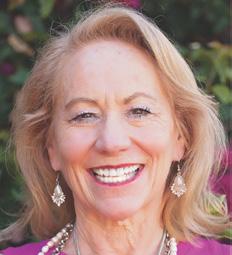
BY PAM FARREL LOVE-WISE.COM
Look for ways to smile: “A joyful heart is good medicine” (Proverbs 17:22 ESV). On those depressing days, plan to do things that have always brought joy to you in the past: a walk, time with family/friends, listening or watching media with a positive message, exercise—or a little chocolate! Take action to release happy endorphins.
Look for ways to praise: “Why, my soul, are you downcast? Why so disturbed within me? Put your hope in God, for I will yet praise him, my Savior and my God” (Psalm 42:5). When downcast (depressed, discouraged, despairing) and when disturbed (having nagging thoughts) the solution is to praise God. Put on inspiring music and read the Psalms; select one that gives hope.
On those depressing days, plan to do things that have always brought joy to you in the past ...
This could read, “You are in a vice grip of pressure, but it won’t flatten you. You have doubts but you are not in utter despair, because God will give an alternative route. You are hunted down and harassed but God is always with you. You have been thrown to the ground but not killed.” List what is going RIGHT!
Look for ways to help others: “Praise be to the God … Father of compassion and the God of all comfort, who comforts us in all our troubles, so that we can comfort those in any trouble with the comfort we ourselves receive from God” (2 Corinthians 1:3–4). List ways God has comforted you. Pass it on.
Look away from pain: “Jesus replied, ‘No one who puts a hand to the plow and looks back is fit for service’” (Luke 9:62). Christ discerned people were struggling with doubt about following Him. For their own good, they each needed to step nearer to the Lord to be distracted from their pain. When I am in turmoil, I play praise music as I plan ministry.
Look to replenish: “So Elijah did as the LORD told him and camped beside Kerith Brook … The ravens brought him bread and meat each morning and evening, and he drank from the brook” (1 Kings 17:5–6 NLT) God sent His weary prophet away from the battle and his enemies. Plan a holistic retreat to replenish you: mind, body and soul.
Look for purpose: When Jesus went to Gethsemane, He said, “My soul is overwhelmed with sorrow to the point of death. Stay here and keep watch with me.” (See Matthew 26:36–39.) Take an extended time away with God to sort out your emotions, find answers to your questions, or gain comfort.
Look for supportive friends: “And they came, bringing to him a paralytic carried by four men” (Mark 2: 3–5 ESV). When Jesus saw the faith of the friends, He healed the man. What friends do you consider your stretcherbearers? Ask your friends to pray with and for you.


Adapted from Discovering Jesus in the Old Testament: A Creative Bible Study Experience by Pam Farrel, Jean E Jones, Karla Dornacher (Harvest House) Pam Farrel is an international speaker, author of over 60 books, and CoDirects Love-Wise Ministry with her husband, Bill Farrel.


SHERI SCHOFIELD SHERISCHOFIELD.COM
College was challenging for me. I had a double major—theology and Christian education of children. I wanted to become a missionary.
But I faced two problems in completing my training in Christian education: I needed to take a job for a year as a director of children’s ministries in a Southern California church, and I needed transportation to get there. I had no car.
There was a lot of competition for those directorship jobs because my classmates also had to apply locally for the positions. I was only five-foot-two and looked tiny next to many in my class and I was shy. One sixfoot-four classmate sneered at me saying, “I would never follow you as a leader!”
At the time, his words sank my aspirations toward ministry leadership. I gave up.
for
But God intended me to be a leader! He took me through a very difficult battle once where I had to lead a huge campaign to save my husband Tim’s life. The battle became national and resulted in a new law to protect people. It was later broadcast on ABC’s 20/20 program. Through that battle, I learned about leadership that wins:
1. Pray Frequently and Trust God
I poured my heart out to God and trusted Him to clear the road ahead of me. My request often took the form of just one word: “Help!” Prayer became my power source. Others prayed too. Those prayer warriors became my team.
2. Keep Emotions in Check
I didn’t cry around our young children. I kept them away from the battle as much as possible. In fact, it wasn’t until I wrote a book about this event many years

later that my children learned all that happened (One Step Ahead of the Devil). My husband, who was in the middle of the struggle, needed me to be strong for him. So I asked the Lord to help me hold it together emotionally and to keep me from crying or being upset around him, too.
3. Stay Focused on the Facts and Objectives
My opponents tried to legally overwhelm me by arguing that things changed as the battle progressed, therefore I needed to bow to their authority. I rejected that thought. I reminded my opponents of their original illegal premise of the battle and did not yield.
4. Communicate and Seek Help
I was honest about the struggle and asked for others’ help in specific ways. When God opened windows bringing help, I reached out and grasped the gift.
5. Document Everything

him, regardless of how you feel about him. It leaves the door open for God’s grace to reach his heart.
This quote by W. H. Murray, a Scottish author and mountain climber, helped me fight the battle and later to write about it. I taped these words above my desk: “This may sound too simple, but is great in consequence. Until one is committed, there is hesitancy, the chance to draw back, always ineffectiveness.
Prayer became my power source. Others prayed too. Those prayer warriors became my team.
Having a record of the facts helped keep me grounded and prepared for any challenges that arose.
6. Forgive Your Opponent and Pray for Them
After the battle, forgive your opponent and pray for
Concerning all acts of initiative (and creation), there is one elementary truth the ignorance of which kills countless ideas and splendid plans: that the moment one definitely commits oneself, then providence moves too. A whole stream of events issues from the decision, raising in one’s favor all manner of unforeseen incidents, meetings and material assistance, which no man could have dreamt would have come his way.
Whatever you can do or dream you can, begin it. Boldness has genius, power and magic in it!”

Sheri Schofield, award-winning author, lives in Wyoming. In addition to her books, she has written for Arise Daily devotions since its beginning. Check out her website at www.sherischofield.com.

FROM MARJORIE WINGERT & JOAN C.BENSON FROM MARJORIE WINGERT & JOAN C.BENSON

The 4-book Cornerstone series introduces children to the beauty of their identity in God and His unique plans for their lives. Perfect for ages 2–8, these books combine engaging rhymes, colorful illustrations, and biblical truths to nurture young hearts.
Who Am I?—A heartwarming book that assures God’s love and good plans for each uniquely designed child.
Wonder of Life—Teaches the value of life and affirms that God created each person intentionally and beautifully.
Let’s Be One: God’s Human Race— This award-winning book in the series encourages unity, love, and appreciation for diversity as part of God’s design and purpose.
God's ABCs—The award-winning debut book in the Cornerstone series uses a playful alphabet tale where letters A–Z showcase their unique talents, affirming God’s intentional design and addressing gender identity questions with truth and purpose.

Bring home the Cornerstone series today and share the gift of God’s timeless truths with the ones you love.
For more information about the authors and their books, visit www.joancbenson.com and www.marjoriewingert.com.














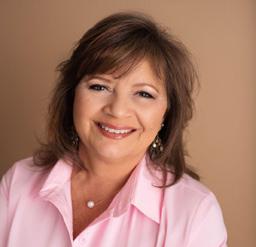
STACY SANCHEZ STACYSANCHEZ.COM
(and
Stacy hit the ground—not on her knees, but flat on her face. Her grandson’s latest violent outburst had pushed the family past their breaking point. Gasping for air in her bedroom, she cried out to God through tears that wouldn’t stop. “God, I can’t breathe. Help me breathe.” The response came gently: “Breathe to the rhythm of My love.”
This wasn’t the retirement Stacy Sanchez had envisioned. After decades of raising children, she and her husband had finally reached empty nest status. Then DCS dropped her grandson on their doorstep. Her daughter had neglected and abused him. This traumatized child became Stacy’s responsibility overnight—along with his explosive reactions and violent episodes. Everything stopped. The writing dreams. The travel plans. The peaceful retirement they’d earned.

But unlike professionals, Stacy had no training, no support. Eventually, she made the heartbreaking decision to send her grandson to a treatment facility. “I have hope, but it’s a different kind,” she explains. “He’s absolutely yours, God.”
Professional counseling became Stacy’s lifeline. Dr. Logan’s words: “Before I can attend to my grandchild’s needs, I have to attend to my needs because I can’t give them what I don’t have.” Self-care wasn’t selfish— it was survival.
Through her journey, Stacy shares steps grandparents can take:
Before I can attend to my grandchild’s needs, I have to attend to my needs because I can’t give them what I don’t have.
Stacy joined a hidden population of 2.7 million grandparents across America who are raising their grandchildren.
The exhaustion was crushing. Trauma specialist Dr. Roderick Logan explained: “One of the biggest reasons why grandparents struggle is aging. Genetically, you’re not the same when you are 65 as you were when you were 25.”
Now add the stress of caring for traumatized children. The collision is devastating.
“Grandparents parenting again are first responders,” Dr. Logan said. “They’re rescuing children, providing first-level care, often with trauma.”
• Start with yourself first. Practice selfawareness and self-compassion.
• Find your peers. People who hear your struggles without judgment.
• Don’t parent alone. Learn skills and be satisfied with your best.
Remember you’re a first responder providing emergency care.
Today, Stacy speaks to other grandparents in similar situations. Her message: “I get it. You are exhausted. It’s okay to rest. It’s okay to take care of you.”
That desperate moment on her bedroom floor wasn’t the end of her story. It was, as God whispered, moving forward—one breath at a time, one surrendered hope at a time.
For the 2.7 million grandparents walking this hidden journey: You’re not failing when you can’t handle everything alone. Start where you are. Breathe to the rhythm of His love. Reach out. You’re moving forward.

Join Stacy’s Facebook Community Grandparents Raising Grandkids: Parenting ... Again?!!! for support and resources.


I gave each VBS child a seed to illustrate gospel planting while sharing our story of Taiwan.
As missionaries, my husband and I witnessed how seedplanting works. In 1984, we led one person to Christ during our month-long trip. When we returned as full-time missionaries in 1999, we found the island had grown from almost no Christians to 2%. After another 15 years of seed-planting by Christians, parts of Taiwan reached 10% Christian.
That’s what we do as Christian storytellers—we plant seeds, water them, and trust God for the harvest. Christ left us with one job: make disciples. Whatever our calling, discipleship remains every Christian’s mission, so our goal as storytellers is still to disciple others to follow Christ well.
Stories touch hearts and move feet in ways instruction manuals cannot. Antoine de Saint-Exupéry said, “If you want to build a ship, don’t drum up people to collect wood ... but rather teach them to long for the endless
immensity of the sea.” As Christian writers, we help people long for the endless love and grace of Jesus. Jesus modeled this throughout his ministry—sheep, prodigals, a Samaritan. His vineyard analogy made discipleship truths compelling and memorable. These stories required engaged hearts and minds to grasp their depth.
We want that same impact. We can weave discipleship throughout our narratives—through characters, personal testimonies, or humor that reveals God’s amazing grace.
1. Show Transformation; Don’t Rush Redemption Characters facing believable struggles and growth help readers understand God’s transformative power. Don’t sanitize examples—be vulnerable and transparent while emphasizing God’s redemptive grace. Make it clear you’re still learning, not that you’ve mastered life. Honesty and humility allow our stories to come alongside others in their faith journey.
Discipleship thrives where honesty lives.
2. Create Space for Reflection Use pauses and questions inviting deeper examination. In fiction, break the fourth wall occasionally. In speaking, ask audiences what they would do. This interaction lets audiences become part of the story, allowing the Holy Spirit to apply truth personally.
Reflection allows the Holy Spirit to work.
3. Emphasize Redemption and Revelation Following Christ means seeing God redeem situations while revealing himself through our experiences. Show characters finding redemption through conflicts. Share what God did and what you learned about Him. Like Mary and Martha discovering Jesus isn’t just a healer but the resurrection and the life, we’re constantly learning who God is.
Redemption through pain mirrors real discipleship.
4. Ground Stories in Scripture

God’s Word never returns void— it’s alive and shares His heart. Include biblical themes, even without references. I heard a speaker at a secular training weave Scripture throughout her message without references. The positive feedback was overwhelming because her words carried divine weight and power.
paragraphs should stir action—prayer, repentance, hope, hunger for God, or desire for change. Ask audiences about their next steps or how your message could change their lives starting today. Trust the Holy Spirit to work on hearts as you share.
Discipleship is movement, not just a moment.
God has called us beyond ourselves. Our writing and speaking will bear eternal fruit when we let the Holy Spirit lead and Jesus shine through our messages. We can intentionally create thirst for God and desire to follow Him, teaching what He’s taught us in our own walk.
The children holding seeds that VBS day reminded me: we’re all seed-planters in God’s kingdom story. Every word we write, story we tell, or testimony we share plants seeds for eternity.

Biblical DNA shapes stories invisibly but powerfully.
5. Point Beyond Inspiration to Invitation Every story should point to Jesus and next steps in faith. Final
Terrie Hellard-Brown writes, coaches, and speaks on discipling our children. She has several books, including Up, Down, and All Around: A Discipleship Handbook for Parents.

Your customers want practical help: - Homeschoolers needing more than curriculum -Busy families wanting discipleship fitting real-li Our line addresses needs with proven, practical res BOOKS MEALTIME MATERIALS
Ready to offer customers what they ' re looking for?

REQUEST A SAMPLE PACK.
TerrieHellardBrown.com

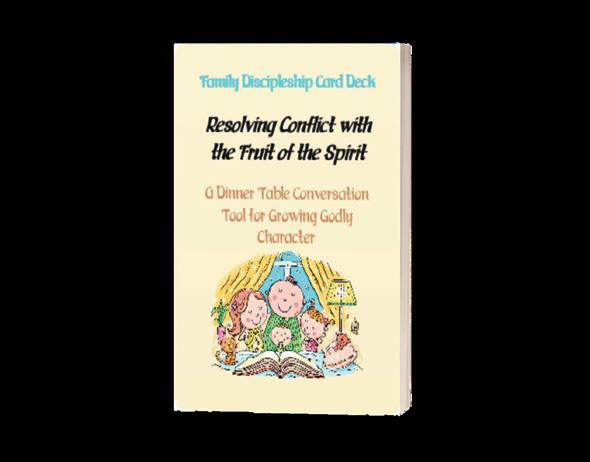




BY GRETCHEN HUESMANN GRETCHENHUESMANN.COM
Sitting among my fouryear-old students, I heard, “It’s a good day to be a teacher.”
“What did you say?” I asked. The child pressed her fingers into soft pink clay and repeated, “It’s a good day to be a teacher.”
I couldn’t quite agree. Like most teachers returning from break, I longed for pajamas and coffee until noon. She grabbed a cookie cutter and added, “Someday I want to be a teacher.” Like the butterflies she shaped, her words settled into my heart. My student knew nothing of teacher burnout or growing exodus from classrooms. Yet, she spoke truth. It is a good day to be a teacher, isn’t it?
As summer ends, thousands of teachers return with trepidation. Concerns include, “How will my class be?” “Can I handle the parents?” “Why am I still doing this?”

Today’s teachers witness extreme behavioral issues and face safety concerns. They welcome children with addicted parents and incarcerated family members. I know one administrator who purchased car seats for a student and her baby sister. A week later, the seats were sold, most likely for drugs.
“So do not fear, for I am with you; do not be dismayed, for I am your God. I will strengthen you and help you” (Isaiah 41:10 NIV). This message permeates It’s a Good Day to Be a Teacher: 52 Devotions to Equip and Encourage Educators, reminding teachers help is available.
2. Build Up Our Educational Leaders: Teachers need more than pats on the back. They desire to be seen and heard by parents, administrators, and the community. God exhorts us in 1 Thessalonians 5:11 (NIV), “Therefore encourage one another and build each other up, just as in fact you are doing.” When conflicts occur, demonstrate trust in teachers until proven otherwise. Support with resources to relieve financial stress. This builds and sustains educational leaders.
3. Foster Grace-Filled Communication: When crises arise, intense emotions and angry emails fly. Instead, “Let your conversation be always full of grace, seasoned with salt, so that you may know how to answer everyone” (Colossians 4:6 NIV). Commit to open communication. Allow emotions to settle before emailing, and resist venting on social media.
Despite these challenges, steadfast educators persist for one reason— the children.
4. Provide the Power of Prayer Support: When my children attended school, moms committed to praying for staff. We adhered to Ephesians 6:18 (NIV), “… always keep on praying for all the Lord’s people.” We compiled teachers’ prayer requests and added petitions for safety, truth-filled lessons, and for God to draw students to himself. Let’s pray for those influencing future generations.
Despite these challenges, steadfast educators persist for one reason—the children.
Parents search for teacher gifts throughout the year. Although welcomed, these tokens do little to encourage educators on difficult days. Here are four recommendations to support our classroom heroes:
1. Find Strength in Faith: Christian educators do not labor alone. Christ accompanies every believing teacher, providing strength, patience, and wisdom.
Teachers possess limited time and energy for students’ lives. By fostering environments where educators feel valued, we encourage them to continue with renewed dedication. Perhaps then they will agree it is a good day to be a teacher.


Gretchen Huesmann is a career educator and author of It’s a Good Day to Be a Teacher. Her work appears in Hope-Full Living Devotions and International School Project.


inspirational speaker, best-selling author, award-w inning journalist

Michelle Medlock Adams was our speaker for the Centerpiece of Christmas event, and she was amazing. She engaged with participants before and after, and her book table was a hit, with many ladies making purchases. Most of all, her love for Jesus shined through in her presentation. Women are still talking about how much they enjoyed having her as our speaker!
—LORI RIFKIND, DIRECTOR SOUTHLAND COMMUNITY CHURCH WOMEN’S
MINISTRY GREENWOOD, INDIANA



